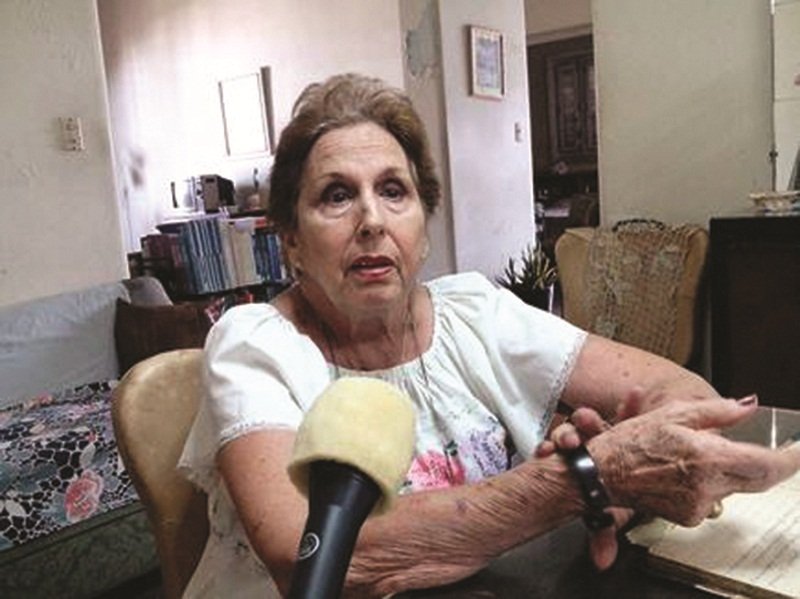
The challenge of assuming a new concept
Marriage has been consolidated as a charter of social and citizen protection that guarantees numerous possibilities. It establishes limits, roles and rights between people, towards them and from them towards the State. The formulation of the article in the Draft Magna Carta has generated controversy. The aim is to break down stereotypes and avoid any form of discrimination.
 By Ana María Domínguez Cruz
By Ana María Domínguez Cruz
digital@juventudrebelde.cu
and
 Yuniel Labacena Romero
Yuniel Labacena Romero
yuniel@juventudrebelde.cu
Posted: Saturday 20 October 2018 | 10:04:22 pm.
A CubaNews translation.
Edited by Walter Lippmann.
DIALOGUE:
So, I don’t agree with Article 68.
Aren’t we in the 21st Century?
Or are we still stuck in the 19th Century?
Love. That is the fundamental reason why two people decide to unite their lives and the basis on which, if they wish, they form a family. Legalizing this union or not is not the most important thing, some think, and jurists insist on the need to value marriage as a legal institution, guarantor of rights for those involved.
Cuba proposes in its Draft Constitution, specifically in article 68, that marriage is the voluntarily agreed upon union between two persons with the legal capacity to do so, in order to make a life in common…, which gives way to the possibility of equal marriage, and it is logical that controversy is awakened in the debates.
As Homero Acosta Álvarez, Secretary of the Council of State, recently pointed out at, the inauguration of the International Congress of Lawyers 2018, today’s draft was confronted with the choice of maintaining the concept of marriage as constitutional (a content barely regulated in the constitutions) or moving away from that and leaving its [further] development to the law.
“It was decided to maintain this configuration and to assume the challenge of the new concept, knowing that its inclusion could generate disagreements, due to cultural reasons, prejudices and stereotyped visions, these are not transformed overnight,” said the member of the Commission responsible for constitutional reform.
“If the Constitution proclaims broad recognition of the right to equality, why should it limit people of different sexual orientations from getting married? It will have to follow this concept anchored in visions already overcome by time or it will have to be modified and recognized as a right, as is gradually happening at the planetary level.
“The positions in front of this regulation are those who prefer to maintain the concept of the current Constitution; those who favor the current proposal in the Project; those who accept the civil recognition of de facto couples and not marriage. There are others who agree, but limit the right to adoption and, finally, some advocate the concept of “two or more persons”. In short, a diversity of criteria that have to be evaluated like others with the rigor and depth that is required,” he said.
A wonderful way to start thinking
Lilian, divorced and with two children, also agreed with the ideas explained by the Secretary of the Council of State. She thinks this variation of the concept of marriage is a wonderful way to begin to think. “Each person has the absolute freedom to love another and the most important thing is that affection takes precedence in that relationship. If it is a couple of the same sex, love is still the most important thing. And if now there is the possibility that the legal protection of their rights is guaranteed, it’s better.
She refers at this point to the fact that there are still those who believe that homosexuality is a disease, synonymous with promiscuity, brazenness and few moral values. “We are happy to the extent that we can live fully, without hypocrisy and without maintaining appearances. This is a step forward from the social and the cultural. We have to recognize love, and I see it as just,” she says.
For his part, Mario Román -who has lived with René Miguel for four years- values positively that these guarantees are believed, even when they aren’t interested in getting married. “Relationships have the same value. The same rights must be guaranteed for everyone, and marriage is that necessary justice when one of the two is missing, the other has legal protection. Cuba has always fought for equality and we cannot allow people’s sexual orientation to be a cause for discrimination,” he says.
Marta Emilia still remembers with sadness what happened in her neighborhood when Angel died. “We all knew that Victor was his partner for more than 15 years and that Angel’s family always turned their back on him because of his choice. Not even when he was hospitalized did anyone come, much less when Victor spent more than a year taking care of him at home. But when Angel died, nephews and cousins showed up to take the house and Victor was left homeless. That was wrong and I hope those stories won’t happen again.
==
According to Rafael, another interviewee, “our society is not prepared for this modification of the concept of marriage. Therefore, we must defend the ”original design of the family” and what the current Constitution states,” he says. “We have to think about the new generation, when they see two men or two women holding hands, in the street or kissing. That was always frowned upon and I still see it the same way,” he says.
From the poll carried out by this newspaper and from the comments left on our web edition, other criteria also emerge against it: the negative effects on the birth rate, the transformation of the traditional family model, the problem of adoption and the world’s own cosmovision. While these reasons are used in disagreement with what is stipulated in article 68, others believe that it is not possible to try to prohibit a decision of a personal nature.
Katia, married for the second time, says that the myth that having a child in a homoparental home will lead to homosexuality must be banished. “Those who today have relations with people of the same sex did not learn it in their homes, where they lived with their father and mother. Besides, that’s not the issue the constitutional reform is talking about; there’s no need to mix things up,” she says.
And Felicia says our society has yet to go through the necessary transformations in its thinking. “Even in the treatment of men towards women we lack much. It’s enough to listen to some flirtations compliments that become offensive. Tolerance is not the concept, but acceptance and respect for coexistence among all.
Necessary progress
Julio César González Pagés, who holds a doctorate in historical sciences, recognizes that, one hundred years after the approval of the Divorce Law in Cuba, which was very controversial, it is magnificent that this good news arrives. “The country is placed in a position of advancement, because it is something that is closely related to human rights. On a global level, very few countries have endorsed this in their Constitutions, which is why Cuba would be among the few that grant that right.
“First and foremost, the concept of respect for the equal rights of all must prevail. It is not a question of imposing oneself, but of dialoguing among all and contributing to a full education among citizens. It is praiseworthy that, in a nation where homophobic thought was deep-rooted, it now there is a determination that this does not happen again and that we are seeing ourselves as an inclusive society.
“It is also important to stress that this is not just a right for lesbian, gay, bisexual, transgender and intersex (LGBTI) people, but for everyone, because it is the respect that we have for all rights. It is not a question of all people rushing out to get married, because many, homosexual or heterosexual, are not interested in formalizing their relationship in this way at this time, but the existence of the right is the essential thing”, he points out.
The modification reflected in article 68 – which departs from heteronormativity and machismo – is in line with the Conceptualization of the Cuban economic and social model of socialist development. This defines as principles that sustain the model and its main transformations respect for diversity and confronting all forms of discrimination due to skin color, gender, gender identity and sexual orientation.
It is praiseworthy that in a nation where there was a deep-rooted homophobic thought, it is now demonstrated that there is a will that this not happen again and that we are seen as an inclusive society.
It is also due to a culture of rights and social justice that the Cuban Revolution has promoted. It has has won for its citizens what in many nations are unthinkable guarantees, such as safe, legal and free abortion; equal pay for equal work for women and men; maternity and paternity leave; family planning services; sex education in school…
But there are more elements. In the words of the advisor of the Ibero-American and African Network of Masculinities, this is related “to the policy carried out by the country from the campaigns carried out against homophobia and transphobia. Legislation shows that educational and awareness-raising campaigns in respect to free and responsible sexual orientation and gender identity work if there is the political will of the country and the movement of people.
González Pagés warns that there is lots of opposition from groups of people who only see the couple as a means for reproduction or who only accept the family scheme of decades ago, made up of mother, father and children. “They do not understand that the family today includes grandparents, uncles, single mothers, among other archetypes, and that the legalization of a union does not necessarily entail having children.
“This process must not lead to aggressions, offenses or impositions. All processes have people in favor and others in disagreement, which are also included. But in the end, the logic of an educated, educated, highly literate country will mean reason will prevail, as has happened with other laws.
“The new rights of the 21st century cannot frighten us. We are not a backward-looking country because part of the population disagrees, on the contrary. The difference exists and what it is about is to argue, to convince, to dialogue and in no case to impose by force”.
The specialist recalls that Cuba has always been an advanced country, with controversies and confrontations regarding many issues, such as racial and gender discrimination. “Every movement generates these reactions and you have to be prepared for that. Some believe the birth rate will fall in the country because they think this is a process of proselytism in favor of marriage between people of the same sex, but that’s a mistake, it is not so.
“It is a question of legalizing unions that already exist, and so that people do not feel unprotected,” warns the specialist, who assures us that he is proud that “our Draft Constitution is advanced and revolutionary, among other reasons for making this modification. It shows we have a society with all and for the good of all, as is embodied in the Preamble to the Draft Constitution.”
Useful legality
According to the study Deconstructing Myths about Same-Gender Couples from the National Center for Sex Education (Cenesex), the scarce work carried out in the country denotes the existence of similar characteristics among families made up of heterosexuals and homosexuals (commitment, capacity to resolve conflicts, distribution of roles and functions, shared feelings and intimacy, among other indicators).
====
The criteria shared by the interviewees with whom this newspaper spoke, as well as article 68, are in line with other postulates of the Draft Constitution, particularly article 40. It states that “all persons are equal before the law, are subject to equal duties, receive the same protection and treatment from the authorities and enjoy the same rights, freedoms and opportunities, without any discrimination for reasons of sex, gender, sexual orientation, gender identity, ethnic origin, skin color, religious belief, disability, national origin or any other distinction injurious to human dignity”.
Perhaps for this reason, Gina, who has been together with Dania for three years, will not rush to a law firm to legalize her union. “We are not interested in getting married, but it is a right, a protection, an option for those who need it in their life history; and that our Constitution, like others in the world, includes it, has great value”.
Another of the interviewees tells us: “The stigmata and social schemes must crumble, because the treatment between people is sometimes hostile, unjustly. It is not necessary to hide if you love someone and acting cleanly is what favors peaceful coexistence. When ten years pass, we will be able to analyze what has happened on the island and if the taboo persists, but legally recognizing what already exists is a step forward.
Law cannot remain a perpetual slave of social backwardness, even though at some point it may collide with part of the social spectrum. In its transforming mission, it is also responsible for promoting development.
In this sense, Olga Mesa Castillo, Doctor of Juridical Sciences, titular professor and consultant to the Faculty of Law of the University of Havana, remembers that since the promulgation, in 1975, of the Family Code as an independent legal text of the Civil Code, our country was ahead in regulating institutions such as that of civil marriage. We did so in a liberating manner, stripping it of the requirement of physical-sexual capacity; of divorce for just cause, and without guilt; and with a special regulation on de facto union, equating it with civil marriage.
Furthermore, the President of the Cuban Society of Civil and Family Law, of the National Union of Jurists of Cuba, comments that the protection of concubinage was also introduced, and the country was a pioneer in including in its 1940 Constitution the equalization of de facto union with civil marriage.
“Marriage in Cuba today is a voluntary union, without a contractual, legal or business sense, and is not exempt from duties and rights. It is legislated that upon the death of one of the members of the couple, the one who survives is protected by law for the enjoyment of some economic or material benefits,” he says.
The National Law Prize winner regrets that, in a general sense, the population has not worried about knowing about legality and worse still, that many have decided to live outside it, not only concerning marriage but also paternity.
“Marriage means that you are fortunate enough to have a person in your life who also protects you from a material point of view. As a consensual union, there are already same-sex couples who live together and if they want to formalize it before the law, I see no problem in that. On the contrary, problems arise if you want to resort to the law when there is no remedy.
The incorporation of a broader concept of marriage is only the first step on the road to the approval of a new Constitution that will ensure greater legal guarantees for the specific LGBTI population. As Mariela Castro Espín, director of Cenesex, has warned, article 68 is not about taking away the rights of heterosexual couples, but about giving them to those who had been denied them.
Homero Acosta Álvarez recalled: “This is not the first time we have faced these challenges. Let us remember in history the conflicts to recognize women’s right to vote or the establishment of divorce or, in our case, to incorporate the equality of rights between men and women and the equal responsibility of spouses, according to our Family Code.
“In our opinion, Law cannot remain a perpetual slave of social backwardness, even though at some point it may collide with part of the social spectrum. In its transforming mission, it must also promote development,” he said.




You must be logged in to post a comment.